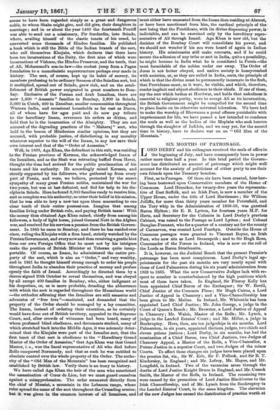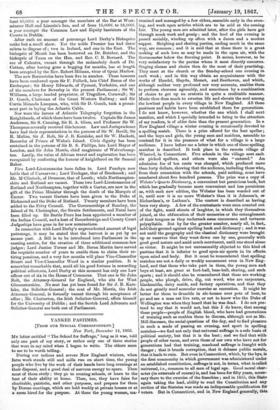SIX MONTHS OF PATRONAGE.
LORD DERBY and his colleagues received the seals of office in the beginning of July, and have consequently been in power rather more than half a year. In this brief period the Govern- ment has distributed an amount of patronage which might well account for the anxiety of politicians of either party to see their own friends upon the Treasury benches.
First, as to Peerages. Of these six have been created, fourlav- ing been bestowed upon Conservative members of the House of Commons. Lord Henniker, for twenty-five years the representa- tive of East Suffolk, and an Irish Peer, is now a member of the Upper House, under the title of Lord Hartismere ; Sir William Jolliffe, for more than thirty years member for Petersfield, and the Tory whip in the Administration of 1858-59, was gazetted Baron Hylton ; Sir E. B. Lytton, for fourteen years M.P. for Herta, and Secretary for the Colonies in Lord Derby's previous Cabinet, was raised to the Peerage as Lord Lytton ; and Colonel Douglas-Pennant, who for a quarter of a century sat for the county of Carnarvon, was created Lord Penrhyn. Outside the House of Commons peerages were granted to Viscount Boyne, an Irish Peer, who now sits as Lord Brancepeth ; and to Sir Hugh Rose, Commander of the Forces in Ireland, who is now on the roll of the Lords as Baron Strathnairn.
It is, however, on the Judicial Bench that the present Premier's patronage has been most conspicuous. Lord Derby's legal ap- pointments for the past six months are very nearly equal with those of Lord Palmerston during his six years' administration from 1859 to 1865. What the new Conservative Judges lack with re- spect to number is counterbalanced by the high positions which most of them have taken. In England, Sir Fitzroy Kelly has been appointed Chief Baron of the Exchequer ; Sir W. Bovill, Chief Justice of the Common Pleas ; Sir Hugh Cairns, a Lord Justice of Appeal in Chancery ; and a Vice-Chancellorship has been given to Mr. Melina. In Ireland, Mr. Whiteside has been appointed Lord Chief Justice ; Mr. John George, a judge in the Court of Queen's Bench ; Mr. Brewster, a Lord Justice of Appeal in Chancery ; Mr. Walsh, Master of the Rolls ; Mr. Lynch, a judge in the Landed Estates' Court ; and Mx. Miller, a judge in Bankruptcy. Here, then, are ten judgeships in six months. Lord Palmerston, in six years, appointed thirteen judges, two chiefs and eleven puisne justices ; Lord Derby, in six months, has had the nomination of a Chief Baron, two Chief Justices, two Judges of Chancery Appeal, a Master of the Rolls, a Vice-Chancellor, a Puisne Justice in a superior Court, and two Judges of the minor Courts. To effect these changes six judges have been placed upon the pension list, viz., Sir W. Erie, Sir F. Pollock, and Sir R. T. Kindersley, in England ; and Mr. Lefroy, Mr. Hayes, and Mr. Longfield, in Ireland. Two of the vacancies arose through the deaths of Lord Justice Knight Bruce in England, and Mr. Cusack Smith, the Master of the Rolls, in Ireland. The remaining two were caused by the promotion of Lord Justice Blackburne to the Irish Chancellorship, and of Mr. Lynch from the Bankruptcy to the Landed Estates' Court, in the same kingdom. The elevation of the new Judges has caused the distribution of practice worth at
least 40,000/. a year amongst the members of the Bar at West- minster Hall and Lincoln's Inn, and of from 15,000/. to 18,000/. a year amongst the Common Law and Equity barristers of the Courts in Dublin.
After such an amount of patronage Lord Derby's Bishoprics make but a small show. Yet the noble Premier has had three mitres to dispose of ; two in Ireland, and one in the East. The bishopric of Meath has been bestowed on Dr. Butcher, and the bishopric of Tuam on the Hon. and Rev. C. B. Bernard. The see of Calcutta, vacant through the melancholy death of Dr. Cotton, after having gone a begging for months, has at length been accepted by the Rev. Robert Milman, vicar of Great Marlow.
The new Baronetoies have been five in number. These honours have been conferred upon Sir F. Pollock, late Chief Baron of the Exchequer ; Sir Henry Edwards, of Pyenest, Yorkshire, and one of the members for Beverley in the present Parliament ; Sir W. Williams, a large landed proprietor, of Tregullow, Cornwall: Sir D. Gooch, Chairman of the Great Western Railway ; and Sir Curtis Miranda Lampoon, who, with Sir D. Gooch, took a promi- nent part in laying the Atlantic Cable.
Nor were the heroes of Atlantic Telegraphy forgotten in the Knighthoods, of which there have been twelve. Captain Sir James Anderson, Sir S. Canning, Sir R. A. Glass, and Professor Sir W. Thompson severally received this honour. Law and Jurisprudence have had their representatives in the persons of Sir W. Bovill, Sir R. Malins, Sir J. Rolt, Sir J. B. Karslake, and Sir W. Hackett, Recorder of Prince of Wales's Island. Civic dignity has been sustained in the persons of Sir B. S. Phillips, late Lord Mayor of London, and Sir John Morris, chief magistrate of Wolverhamp- ton. Lastly, the value of African travel and exploration has been recognized by conferring the honour of knighthood on Sir Samuel Baker.
Five Lord-Lieutenancies have fallen in. Lord Penrhyn now holds that of Carnarvon ; Lord Tredegar, that of Brecknock ; and Mr. M'Clintock, of Druincar, that of Louth ; while Northampton- shire and Rutland are vacant. These two Lord-Lieutenancies of Rutland and Northampton, together with a Garter, are now in the gift of the Prime Minister through the death of the Marquis of Exeter. Two vacant Garters have been given to the Duke of Richmond and the Duke of Rutland. Twenty members have been added to the Privy Council. The Governorships of Bombay, the Island of St. Christopher, the Straits Settlements, and Natal have been filled up. Sir Bartle Frere has been appointed a member of the Indian Council, and a host of R.ecorderships and County Court Judgeships have gone in for new nominations.
In connection with Lord Derby's unprecedented amount of legal patronage, it may be stated that the harvest is as yet by no means past. A Bill is to be introduced into Parliament in the ensuing session, for the creation of three additional common-law judges ; Lord Justice Turner and Mr. Baron Martin have served the requisite number of years to enable them to claim their re- tiring pensions, and a very few months will place Vice-Chancellor Stuart and Vice-Chancellor Wood in a similar position. It is somewhat remarkable that, amid all his good fortune in rewarding political adherents, Lord Derby at this moment has only one Law officer out of six in the House of Commons. That one is Sir John Bolt, the Attorney-General for England, who sits for West Gloucestershire. No seat has yet been found for Sir J. B. Kars- lake, the Solicitor-General ; the seat of Mr. Morris, the Irish Attorney-General, is formally vacant through his acceptance of office ; Mr. Chatterton, the Irish Solicitor-General, offers himself for the University of Dublin ; and the Scotch Lord Advocate and Solicitor-General are both out of Parliament.































 Previous page
Previous page